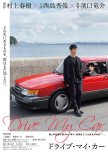Their mouths were filled with words, but their souls were clothed with the unsaid.
The very first week of February, I have realized that I have always desired to live between the borders of the city and the countryside. I both want the busyness of the city and the passive greenery of the countryside; just like how I always found Iceland fascinating with its crisp weather spring and cold, wrathful volcanoes and glaciers.
As I watched Drive My Car, it seemed like I was able to dwell between such paradoxical parallels. I, myself, was in that red Saab 900 having a trip around all my own melancholia, detachment, joy, death, transformation, grace, and, perhaps, hoping that my final destination would be life, itself.
We, the audience, are actually the red Saab 900. As the car took its ride everywhere, it saw the sunny cities only to be blocked by hard, metal and concrete buildings. It hears of the city's sweet promises of opportunities, only to be disturbed by the rushing expressways. Then, it goes a little further from the city only to witness that the natured trees and floras were cold with thick snows. This was also how we perceive the characters in the film: there was beauty and brokenness within them.
Anton Chekhov's Uncle Vanya was featured in the film in which the main protagonist was working to direct an adaptation of the play using multiple languages: Filipino, Mandarin, Japanese, Korean, Malay, and even sign language. In spite of its multilingual feature, there is a certain silence or repression imprisoning the film. Their mouths were filled with words, but their souls are clothed with the unsaid.
The silence embracing the film, though, was greatly rich. There were some parts that I was close to shedding a tear even though there were no exaggeratedly loud neither emotively suggestive background music and acting performances. It was not emotionally manipulative and it truly was its genuine intentions and authenticity that moved me.
Drive My Car truly moved me that I didn't even realize that it could be slow. That slowness, though, was very purposive. For that's how it is to go through grief and to wait for life. It can be slow, as if you are being sucked out of life and light. How could you expect a film about grief and healing to move so fast and quick?
Towards the epilogue, Misaki was seen buying her groceries and driving the red Saab 900 with her new friend, a dog (which made me squirm a little for how adorable it was). At that moment, I understood that life is not the final destination. Life, itself, is the journey. For life does not stop, but it keeps going on. The dead has reached their destination already, but, we, the living, must keep going on with the journey. Keep driving your car, humans.
†† † † † ‡
"What can we do? We must live our lives. Yes, we shall live, Uncle Vanya.
We shall live through the long procession of days before us, and through the long evenings; we shall patiently bear the trials that fate imposes on us; we shall work for others without rest, both now and when we are old;
and when our last hour comes we shall meet it humbly, and there, beyond the grave, we shall say that we have suffered and wept, that our life was bitter, and God will have pity on us.
Ah, then dear, dear Uncle, you and I shall see that bright and beautiful life; we shall rejoice and look back upon our sorrow here; a tender smile -- and -- we shall rest.
I have faith, Uncle, fervent, passionate faith."
As I watched Drive My Car, it seemed like I was able to dwell between such paradoxical parallels. I, myself, was in that red Saab 900 having a trip around all my own melancholia, detachment, joy, death, transformation, grace, and, perhaps, hoping that my final destination would be life, itself.
We, the audience, are actually the red Saab 900. As the car took its ride everywhere, it saw the sunny cities only to be blocked by hard, metal and concrete buildings. It hears of the city's sweet promises of opportunities, only to be disturbed by the rushing expressways. Then, it goes a little further from the city only to witness that the natured trees and floras were cold with thick snows. This was also how we perceive the characters in the film: there was beauty and brokenness within them.
Anton Chekhov's Uncle Vanya was featured in the film in which the main protagonist was working to direct an adaptation of the play using multiple languages: Filipino, Mandarin, Japanese, Korean, Malay, and even sign language. In spite of its multilingual feature, there is a certain silence or repression imprisoning the film. Their mouths were filled with words, but their souls are clothed with the unsaid.
The silence embracing the film, though, was greatly rich. There were some parts that I was close to shedding a tear even though there were no exaggeratedly loud neither emotively suggestive background music and acting performances. It was not emotionally manipulative and it truly was its genuine intentions and authenticity that moved me.
Drive My Car truly moved me that I didn't even realize that it could be slow. That slowness, though, was very purposive. For that's how it is to go through grief and to wait for life. It can be slow, as if you are being sucked out of life and light. How could you expect a film about grief and healing to move so fast and quick?
Towards the epilogue, Misaki was seen buying her groceries and driving the red Saab 900 with her new friend, a dog (which made me squirm a little for how adorable it was). At that moment, I understood that life is not the final destination. Life, itself, is the journey. For life does not stop, but it keeps going on. The dead has reached their destination already, but, we, the living, must keep going on with the journey. Keep driving your car, humans.
†† † † † ‡
"What can we do? We must live our lives. Yes, we shall live, Uncle Vanya.
We shall live through the long procession of days before us, and through the long evenings; we shall patiently bear the trials that fate imposes on us; we shall work for others without rest, both now and when we are old;
and when our last hour comes we shall meet it humbly, and there, beyond the grave, we shall say that we have suffered and wept, that our life was bitter, and God will have pity on us.
Ah, then dear, dear Uncle, you and I shall see that bright and beautiful life; we shall rejoice and look back upon our sorrow here; a tender smile -- and -- we shall rest.
I have faith, Uncle, fervent, passionate faith."
Was this review helpful to you?


















